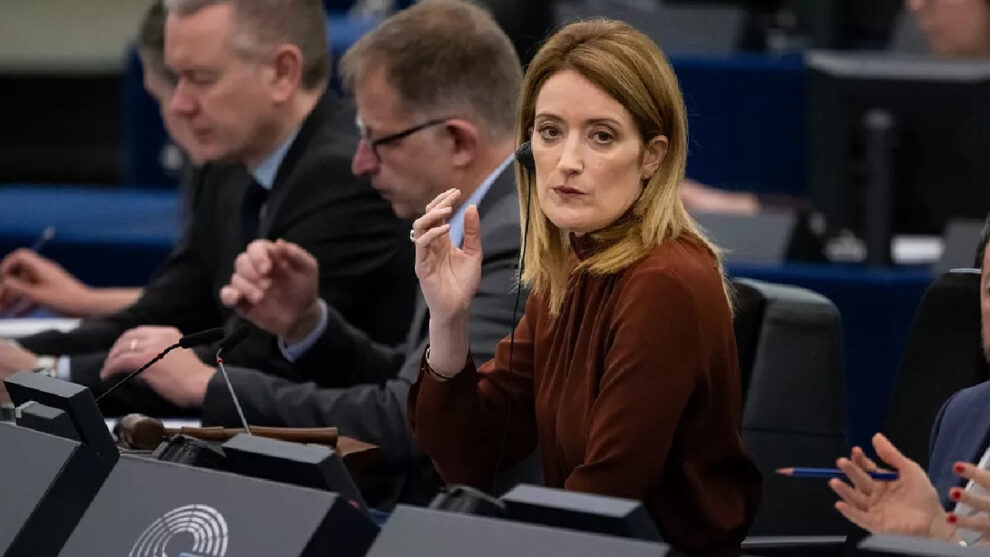Roberta Metsola, the president of the European Parliament, has been urged to intervene in a deepening legislative standoff between Germany and the European Commission over the survival of combustion engines and the viability of e-fuels.
The president is expected to send a letter in the coming days in a bid to break the weekslong impasse, which threatens to derail one of the European Union’s landmark climate laws and set a dangerous precedent for future negotiations.
Germany is blocking the final approval of a measure that will impose a 100% reduction in CO2 emissions on new sales of cars and vans across the bloc as of 2035, effectively banning new diesel and petrol cars.
The Commission says the far-reaching proposal is essential to achieve climate neutrality by mid-century because the average lifespan of a vehicle is 15 years.
The law was negotiated between the co-legislators, the EU Council and the European Parliament, and was rubberstamped by the hemicycle in February.
It was then sent back to the Council, where the previous agreement was expected to be honoured without any major fuss or delay.
But Germany took everyone by surprise when it demanded an exemption for e-fuels, an emerging technology that combines hydrogen and carbon dioxide to create substitutes for oil-based fuels.
A process based on ‘mutual trust’
The law currently on the table is based on CO2 emissions detected at the exhaust pipeline, a condition that rules out the use of e-fuels as of 2035.
Germany’s transport ministry, which is controlled by the business-friendly FDP party, is asking for a separate piece of legislation that would open the door for e-fuels after the cut-off date.
“The proposals must contain more than a vague declaration of intent,” German Transport Minister Volker Wissing wrote this week on his Twitter account.
“Any solution that allows combustion engines to be used exclusively with climate-friendly e-fuels even after 2035 is a good solution for Europe as a business location.”
In response, European lawmakers recruited their president, Roberta Metsola, to speak on their behalf and express their collective outrage over the deadlock.
In a meeting on Thursday morning, the leaders of three political parties – socialists, liberals and greens – formally asked Metsola to send a letter to the EU Council, officials with knowledge of the discussions told Euronews.
The centre-right European People’s Party (EPP), which holds the biggest German delegation in the hemicycle, voted against the move.
Stéphane Séjourné, the leader of the Renew Europe party, adopted a critical position in direct contrast with his fellow liberals in Berlin.
“This debate is not a technical one. It is a question of principle: both institutional and political,” Séjourné said in a statement. “The European Parliament needs to flex its muscles. The Council has created this mess, it needs to fix it. This is a question of credibility for the EU general interest.”
In a statement to Euronews, Socialist leader Iratxe García said the ongoing dispute was not only about one specific file but also “the way the co-legislator works. The whole process is based on the mutual trust of the two institutions to respect the agreement.”
It is unclear when Metsola’s letter will be sent, although it is expected between Friday and Monday.
Such high-profile intervention at the very last stage of a legislative process is extremely rare in EU politics.
E-fuels top the EU agenda
Until Germany decided to delay the vote on the combustion engine ban, the issue of e-fuels had little to no prominence in the EU agenda.
The law negotiated by the co-legislators did include a recital to review the technological developments made by 2026 in the field of zero-emissions transport.
In principle, the recital could offer a way for exempting e-fuels after 2035 but the provision is not legally binding and is up for the Commission to trigger unilaterally.
“It’s important that if we reach an agreement between co-legislators, which is tough enough, and that agreement, I think, is historic, that everyone who is part of that agreement respects that agreement,” Frans Timmermans, the Commission’s vice-president in charge of the Green Deal, said on Thursday.
“I think I’m confident that we can find a way to make sure the interpretation that we give to the agreement is to the satisfaction also of the German authorities.”
Proponents of e-fuels say the technology can be climate-neutral if the hydrogen used in the production is entirely renewable and the carbon dioxide is directly captured from the air.
They also argue e-fuels can help maintain parts of the existing road fleet because the liquid can be poured directly into modern-day combustion engines, without the need to replace them.
But detractors say e-fuels are energy inefficient and release pollutant emissions when they are combusted, making them unsuited for the green transition.
Critics also say e-fuels should be promoted in sectors like maritime transport and aviation, where a low-carbon alternative does not yet exist on a large scale, instead of in road transport, where electric vehicles are already available on the market.
“The combustion engine phase-out is absolutely necessary to align Europe’s road transport sector with Europe’s climate goals,” nine environmental NGOs wrote this week in a letter sent to German Chancellor Olaf Scholz.
“At stake is not just the single most important law to tackle emissions from road transport, but the credibility of the EU’s democratic and legislative norms.”
Source: Euronews















